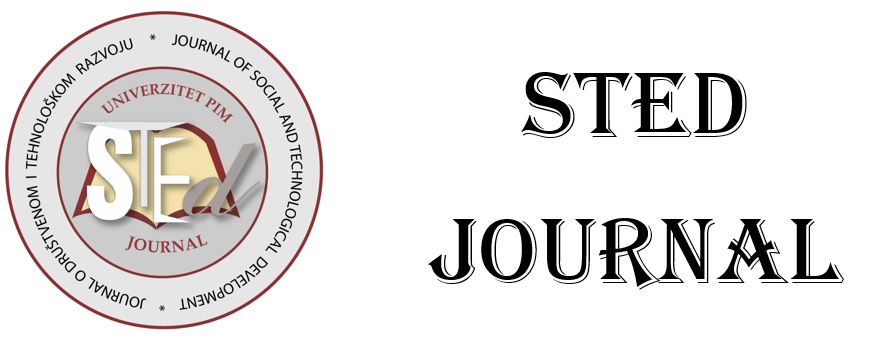Current issue

Volume 7, Issue 2, 2025
Online ISSN: 2637-2614
ISSN: 2637-2150
Volume 7 , Issue 2, (2025)
Published: 28.11.2025.
Open Access
All issues
Contents
29.05.2023.
Original scientific paper
THE INTERACTION OF FAMILY AFFECTIVE ATTACHMENT AND PASSIVE DEPENDENCE IN PARTNER RELATIONSHIPS
The paper has the main goal to determine whether there is a statistically significant connection between early created affective relationship between parents and children and later partner relationships. The research was conducted on a sample of 136 respondents, 75 women and 61 men. The following questionnaires were used in this research: a structured questionnaire for sociodemographic and family data (gender, education, marital status, completeness of the family, family functionality, upbringing, alcoholism in the family during childhood and psychiatric diseases), a questionnaire about family affective attachment and the scale of passive dependence in partner relationships. The data were collected via social networks. The research results confirmed tre expected frequency distribution of the four patterns of affective attachment in our sample. Also, it was shown that respondents of different patterns of family affective attachment discriminate in the level of passive dependence in partner relationships. According to the data obtained through statistical processing, respondents with an occupied attachment pattern achieve the highest scores on the Questionnaire of Passive Dependence in Partner Relationships, while securely attached respondents achieve the lowest scores. Although insecurely attached subjects achieved higher scores on the mentioned questionnaire than securely attached subjects, this difference was not statistically significant, and that is why our third hypothesis was rejected.
Tijana Bogdanić, Snežana Samardžić
30.05.2022.
Professional paper
PSYCHODYNAMIC ANALYSIS OF MURDER WITH INCESTIOUS BACKGROUND
Incest as a sexual behavior psychiatry observes solely as a psychopathological phenomenon. The essence of incest is in sexual contact between close relatives, and the causes of its occurrence are in a personality of sex offenders and also in an environment in which they grew up. According to Freud, the incest taboo is one of the strongest prohibitions of the mankind, which characterize every culture. In the world of schizophrenic, incest which is committed (or from which they defend themselves) is usually that is considered a serious sin by people and which is rare among healthy population, and that is: incest between mother and son, and between brother and sister. So far researches emphasize that incest usually causes strong emotional trauma from which some phobias, depression, anxious states can be developed and other psychiatric disorders. The case of murder in family is analyzed in this task. Incestuous relationships determined a form and content of the patient’s clinical picture which was burdened with deep feelings of guilt, anxiousness, fear and depression, with homicide and suicide behavior.
Snežana Samardžić
28.05.2021.
Original scientific paper
PORODIČNO AFEKTIVNO VEZIVANJE I AGRESIVNOST KOD NEPSIHOTIČNIH POČINILACA NASILNIH KRIVIČNIH DELA
Problem agresije i agresivnosti veoma je aktuelan u naše vreme. Sama agresija nije nasilje, ali to postaje kada se ispolji kao kriminalni akt. Dosadašnja teoretska sagledavanja i konkretna istraživanja prirode nasilnog ponašanja bar u određenoj meri impliciraju da su mnogi poremećaji u strukturi ponašanja (između ostalog i nasilno, kriminalno ponašanje) jednim delom uslovljeni i poremećenim porodičnim odnosima. Aktuelno istraživanje, oslanjajući se na teoriju afektivnog vezivanja, imalo je za cilj da ispita da li postoje neke razlike unutar grupe nepsihotičnih počinilaca nasilja sa različitim obrascima porodične afektivne vezanosti u odnosu na vrstu i nivo agresivnosti. Ispitivanje je provedeno na uzorku od 62 ispitanika muškog pola, sa istorijom počinjenja nekog nasilnog krivičnog dela. U ispitivanju usvojenih obrazaca porodične afektivne vezanosti (PAV) korišćen je modifikovani Brenanov upitnik za procenjivanje PAV, dok su nivo i struktura agresivnosti ispitivani pomoću skale agresivnosti BPAG. Rezultati su pokazali da sigurno vezani ispitanici imaju najniži nivo agresivnosti po svim modalitetima koje meri korišćena skala u odnosu na ispitanike sa nesigurnim vezivanjem. Takođe, ispitanici sa okupiranim obrascem vezivanja pokazuju značajno veći nivo hostilnosti, a plašljivo vezani pokazuju značajno veći nivo besa, hostilnosti i ukupne agresivnosti. Između sigurno i odbacujuće vezanih nije nađena statistički značajna razlika.
Snežana Samardžić
29.11.2021.
Original scientific paper
EARLY FAMILY INTERACTIONS IN CASE OF SEXUAL DELINQUENTS
It is the fact that sexual deviations and delicts are present in all cultures and within all peoples during the whole history of mankind and this have always caused the attention of theoreticians in their quest for its roots. Having on mind this fact, we have analysed the family dynamics during early childhood of sexual delinquents through the search for the differences in perceived parental acceptance or rejection, family affective attachment and accepted script injunctions – in relation to healthy examinees. The research is based on sample of 42 examinees categorised in two groups: a group of sexual delinquents and a group of examinees from general population without psychological disorder diagnosis. The analyses of perceived index of parental acceptance is carried out by Rohner PAR-Q questionnaire, for the determination of affective attachment patterns we use modified Brennan questionnaire for the estimation of family affective attachment, while level and the nature of acquired script injunctions have been asnalysed by the Scale of script injunctions. The results show that there are statistically significant differences between the two groups regarding dominating patterns of family affective attachment with more dominant insecure attachment in the group of sexual offenders. Too, one of the characteristics of this group is above average exposure to the existence injunction, value injunction, Don`t be a child injunction, and health injunction, while differences regarding perceived index of parental acceptance/rejection are not statistically significant
Snežana Samardžić, Spasenija Ćeranić
26.05.2020.
Original scientific paper
PORODIČNA AFEKTIVNA VEZANOST KOD SUICIDALNIH PACIJENATA
Rad se oslanja na Bowlby-jevu teoriju afektivnog vezivanja, u skladu sa pretpostavkom da kvalitet afektivne vezanosti u detinjstvu predviđa kasnije psihološko funkcionisanje osobe, te da samoubistvo, kao autodestruktivni čin, može biti posledica nesigurne vezanosti. Cilj ovog rada bio je utvrditi da li se pacijenti, koji su ispoljili suicidalno ponašanje, češće svrstavaju u neki od nesigurnih obrazaca vezanosti, u odnosu na zdrave ispitanike bez suicidalnih tendencija. Istraživanje je provedeno u Specijalnoj bolnici za psihijatriju u Sokocu, a uzorak je činilo 80 ispitanika muškog pola, svrstanih u dve grupe: grupu suicidalnih pacijenata (N1=40) i grupu zdravih, nesuicidalnih ispitanika (N=40). Kratkim, strukturiranim upitnikom napravljenim za potrebe ovog istraživanja, prikupljeni su podaci o subjektivnom doživljaju majke i oca. Ispitivanje porodične afektivne vezanosti provedeno je modifikovanim Brennanovim upitnikom, za procenjivanje porodične afektivne vezanosti (Stefanović-Stanojević, 2005). Za testiranje razlika između grupa korišćen je χ² test. Rezultati pokazuju da postoji statistički značajna razlika između ispitivanih grupa i to tako, da su se ispitanici iz grupe suicidalnih, značajno češće svrstavali u nesigurno-okupirani i nesigurno-plašljivi obrazac vezivanja (χ²(3)=23,928; p=0,000) i češće su odrastali uz prezaštićujuću, agresivnu ili majku sa psihičkim problemima (2(3)=28,976; p=0,000), dok razlike u odnosu na doživljaj oca nemaju statističku značajnost (2(2)=3,436; p=0,179).
Snežana Samardžić










